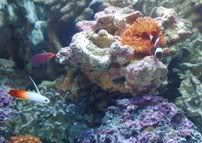
Originally Posted by
Amphibious

...Attaching common names (names given to scientific items by the general public because they won't take the time to learn) are most often miss leading. For instance, my pet favorite, False Percula Clown. There is no such fish in the scientific world. The fish referred to as the FPC is Amphiprion ocellaris, the Ocellaris Clown the name of the fish being keyed off here is of course Amphiprion percula. We could keep everything straight if we simply learned to use correct terminology.






 Reply With Quote
Reply With Quote






 Vquilibrium Productions
Vquilibrium Productions safe for another day!
safe for another day!











 icon under there name and give them Reputation points
icon under there name and give them Reputation points

Bookmarks